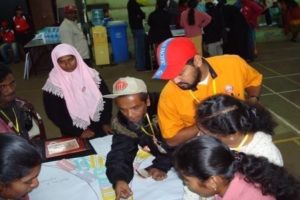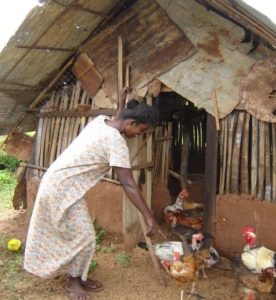Social Economical and Environmental Developers (SEED) was established in 1996 as a not for profit NGO (Company Limited registration GA 327, working in Vavuniya District, Northern Province, Sri Lanka. Its founders were committed to social change in Sri Lanka and to establishing a non-governmental organization specifically to help people affected by the conflict. At the time, many families had lost their homes, loved ones, extended family support systems, and livelihoods and were living under extremely harsh conditions, traumatized from the effects of the war.
The name SEED represents the three elements necessary for change – social, economic, and environmental awareness and the word developers represents the fact that to ensure that change is sustainable, others would need to be equipped to carry on the work.
The young seedling growing out of an old coconut with the world map was chosen as the symbol for SEED because the coconut is common in all three ethnic communities in Sri Lanka and therefore symbolic in terms of working together for change.
Our Vision
Moving towards conscientized sustainable & holistic live
Our Values
• Humanism
• Equality
• Participation
• Rights based initiatives
• Simple and Harmonious life with nature
• Transparency
Our Mission
Working with the vulnerable communities through, learning, sensitization and adapting to the environment through mentoring to attain a viable dignified life thereby, aiming at social change in Sri Lanka.
Our Objective
To work with and empower vulnerable communities in achieving their basic needs.
To work in partnership with government, local authorities and community based organizations to uplift vulnerable communities.
To work towards a society without any discrimination.
To influence the national policies related to vulnerable communities.
Our Philosophy
We believe at SEED that our partner communities are capable of finding their own path to development. We help achieve this by facilitating and assisting the creation of independent and empowered communities and individuals. Our methodology is based on SEED’s unique approach to teamwork and our experiential learning.
“Learning and team building provide the inspiration for social change”.
We place particular emphasis on the needs of vulnerable groups including those with special needs, women headed households, children, and internally displaced people, as the position of these groups within Sri Lankan society is very often marginalized. We believe that their situations can only be improved through individual and community development support. 
We therefore concentrate on partnership development with all community stakeholders including individuals within the community, government authorities, educational organizations, medical organizations, and local, national and international NGOs.
“The cornerstone to developing a better life for vulnerable groups in conflict affected Sri
Lanka is sensitised and creative community action aimed at generating social change”.
SEED also takes the issue of gender very seriously. A large proportion of SEED’s most rewarding work has been to address gender issues within conflict-affected communities where the male family head is often missing or deceased. For women in this situation empowerment may mean successfully taking on the mantel of primary breadwinner and becoming an advocate for the family.
Our Constituency
Since 1996, SEED has concentrated on the development and empowerment of the Vavuniya District community because a high number of internally displaced people gathered here as a result of the conflict. Living in government welfare centres or in an abject poverty people suffered through lack of adequate accommodation, space, food, nutrition, and medical facilities. We chose to assist the three most vulnerable groups. They are:
• Women-headed households
• People with special needs
• People living under the poverty line which includes children
 We particularly chose women because many women are responsible for their families in this district. The thirty-year conflict has created more women-headed households primarily through the high mortality rate, landmines, lack of nutrition, access to medical facilities, and poverty. These women have been forced to play a major role within their families and look after the economic and social needs of both their children and aging parents. Sadly in our society there continues to be shame attached to being a widow or a separated mother and in some of our celebration she is even considered a bad omen. We believe it is important for these women to gain the strength to stand alone and to be given the same rights and privileges of any in our culture, often not even recognized in our communities, their families are ostracized other person. People with special needs have also historically been isolated
We particularly chose women because many women are responsible for their families in this district. The thirty-year conflict has created more women-headed households primarily through the high mortality rate, landmines, lack of nutrition, access to medical facilities, and poverty. These women have been forced to play a major role within their families and look after the economic and social needs of both their children and aging parents. Sadly in our society there continues to be shame attached to being a widow or a separated mother and in some of our celebration she is even considered a bad omen. We believe it is important for these women to gain the strength to stand alone and to be given the same rights and privileges of any in our culture, often not even recognized in our communities, their families are ostracized other person. People with special needs have also historically been isolated
Through the conflict and lack of proper medical assistance, food and nutrition, landmines, bombings, and psycho-social stress there have been an increase in the numbers of those of us with special needs. We feel that with knowledge of the various resources and education on the importance of medical assessments and intervention, nutritious and adequate food, the development of reading and writing skills, social support, and guidance that many special needs people will be able to find their place and contribute in society
The conflict has also created great poverty. Families, who grew their own food, were once self-sufficient, had large extended family support systems, and owned their own businesses or land found themselves struggling on a daily basis with little or nothing at all. We are committed to supporting the basic needs of these families, establishing them back in their communities or in new communities, and helping them to generate income for themselves.
We are doing this through primarily through our Integrated Resettlement and Rehabilitation Projects, and our Community Based Rehabilitation and Development projects and children and youth empowerment Programmes also have livelihood development activities.
“We believe that everyone needs to be fully integrated in their communities and supported for any kind of desired positive social change. We base our activities through a participatory process, which involves all community members and creates awareness and sensitivity of social conditions. This ultimately drives towards positive changes”
Our Organisation
From a base of three staff and two projects in 1996, SEED has grown substantially over time. In 2017 SEED employs approximately 62 well-trained staff (mixed experience & training) and with about 22 communities based volunteers, as well as having a network of local and international volunteer network.